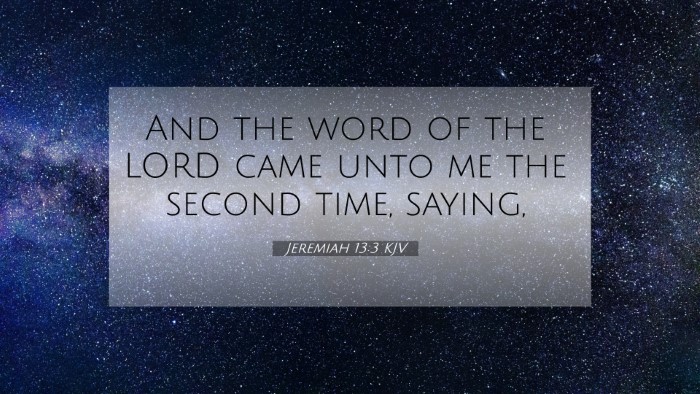Understanding Jeremiah 13:3
Jeremiah 13:3 states: "And the word of the Lord came unto me the second time, saying,
This verse emphasizes the ongoing communication between God and the prophet Jeremiah. It signifies a divine instruction that is both significant and multifaceted, showing the importance of receiving God’s word and responding to it.
Contextual Insights
The context of Jeremiah's ministry reveals a time of impending judgment for the people of Judah. The symbolism in this verse serves as a declaration of God's displeasure and as a call to repentance.
Commentary Insights
-
Matthew Henry:
He underscores the significance of God's communication to Jeremiah as a repeated and unyielding proclamation of prophetic warning. Henry points out that God is resolute in his message to the people, showcasing His persistent nature in seeking repentance.
-
Albert Barnes:
Barnes highlights the importance of the message that follows this verse. He suggests that God’s word acts as an instrument to prepare the hearts of the people to hear the prophetic warnings with a sense of urgency. Barnes also elaborates on how this call to repentance reflects God's mercy amid impending doom.
-
Adam Clarke:
Clarke discusses the implications of the ‘second time’ phrase, indicating that God's patience in delivering His message is profound. Clarke emphasizes the relentless nature of divine prompting, indicating that God provides ample opportunity for acknowledgment and amendment of ways.
Thematic Connections
Understanding Jeremiah 13:3 also requires us to explore thematic connections within scripture. Here are some Bible verses that relate to this theme of divine communication and prophetic warnings:
- Isaiah 6:8: “Also I heard the voice of the Lord, saying, Whom shall I send, and who will go for us? Then said I, Here am I; send me.” (This verse reflects God's call to His prophets.)
- Ezekiel 2:7: “And thou shalt speak my words unto them, whether they will hear, or whether they will forbear: for they are most rebellious.” (This scripture illustrates the heavy burden of prophetic responsibility.)
- Amos 3:7: “Surely the Lord God will do nothing, but he revealeth his secret unto his servants the prophets.” (Here, we see God's approach of revealing His plans through prophecy.)
- Hebrews 1:1-2: “God, who at sundry times and in divers manners spake in time past unto the fathers by the prophets, hath in these last days spoken unto us by his Son.” (This connects the Old Testament prophetic tradition with the New Testament revelation.)
- Matthew 11:10: “For this is he, of whom it is written, Behold, I send my messenger before thy face, which shall prepare thy way before thee.” (Indicating the role of prophets as forerunners.)
- 2 Chronicles 36:15-16: “And the Lord God of their fathers sent to them by his messengers, rising up betimes, and sending; because he had compassion on his people, and on his dwelling place: But they mocked the messengers of God, and despised his words, and misused his prophets...” (This verse depicts the consequences of rejecting prophetic messages.)
- James 5:10: “Take, my brethren, the prophets, who have spoken in the name of the Lord, for an example of suffering affliction, and of patience.” (Encouraging reflection on the endurance of prophets.)
Practical Applications
In light of these commentaries and thematic Bible verse connections, Jeremiah 13:3 encourages us to:
- Be receptive to God’s messages in our lives.
- Understand the role of prophetic voices in guiding and warning us.
- Reflect on the continuous dialogue God desires to have with His people.
- Engage in prayer and study to deepen our understanding of God’s word.
Conclusion
The significance of Jeremiah 13:3 transcends its immediate context and invites us into a deeper exploration of God’s communication with humanity. Through the various scriptural cross-references and the insights from public domain commentaries, we gain a richer understanding of the role of prophecy and the importance of being attuned to God’s voice in our lives.



